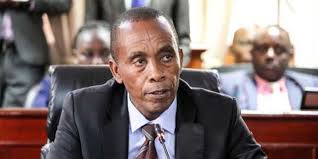KIAMBU, Kenya — At first light on Tuesday, detectives from Kenya’s anti-corruption watchdog stormed the home of Kiambu Governor Kimani Wamatangi. What they found sparked national headlines: bundles of cash—Sh12 million in Kenyan currency and another $13,000 in US dollars.
The Ethics and Anti-Corruption Commission (EACC) says the early-morning raid is part of a broader investigation into what it calls a “sophisticated network” of financial fraud and abuse of office in the county’s leadership.
“We have reason to believe public funds were misappropriated on a large scale,” said EACC Director Abdi Mohamud during a press briefing in Nairobi. “The cash recovered was part of ongoing efforts to trace illicit assets linked to procurement irregularities.”
Governor Wamatangi, who was arrested alongside eight senior county officials, was later taken to the EACC’s Nairobi headquarters for questioning. His arrest sparked an immediate reaction—dozens of his supporters gathered outside the agency’s offices, demanding his release and denouncing the move as political.
“He has served Kiambu with integrity,” shouted one protester, waving a placard bearing the governor’s portrait. “This is a witch-hunt.”
Among those detained are Peter Njoroge, the County Secretary, Nancy Njeri, the Finance Executive, and Salome Muthoni, who oversees Lands. Key figures from the finance and procurement departments, including a clerical officer and a private businessman, were also arrested.
According to investigators, the officials are suspected of engaging in direct business with the county—a violation of public service rules—and receiving over Sh1.5 billion in payments through suspect contracts.
One of those contracts reportedly went to M/s Filtronic International Limited, a company linked to Bernard Kabaiku, who is also in custody.
While the Governor’s legal team has remained tight-lipped, insiders within his administration have suggested that the timing of the raid may be politically motivated, hinting at deeper rifts within the ruling coalition.
The EACC, however, insists the probe is grounded in months of audit trails and financial scrutiny. “This is not sudden,” Mohamud said. “We have followed the money. The facts will speak for themselves.”
The case now moves to the Directorate of Public Prosecutions, which will decide whether charges should be filed. Meanwhile, pressure is mounting on the county leadership to respond to the allegations.
In the heart of Kiambu, where the Governor built his political reputation as a reformer, residents are watching with a mix of shock and skepticism.
“I voted for him hoping he’d fix the rot,” said Mary Njoki, a trader at the central market. “If the money was stolen, we deserve to know the truth.”
This story continues to unfold—and with millions at stake, the spotlight is firmly fixed on one of Kenya’s most powerful counties.
















